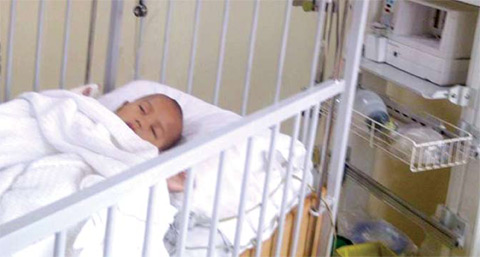Puan Zura was not particularly alarmed when her then 11- month-old son Amir Reza, had a fluctuating fever over the course of two days. When she and her husband picked little Amir up from nursery on Friday, 3rd June 2011, he only had a slight temperature and was still able to play and move around as usual. On Saturday, his temperature was slightly higher, but still manageable. Puan Zura thought it could be due to a development milestone, as her son was just around the age when babies start walking.
So, Puan Zura continued with some paracetamol syrup every four hours to keep the fever in check. But on the third night, Amir started vomiting, and whenever he breastfed, he threw up all that he had taken in. Puan Zura thought that perhaps it had something to do with what she ate, as breast milk could be influenced by the food taken in.
The bouts of vomiting and high temperature did not cease throughout the night, and Puan Zura began to get really worried. Amir was also getting cranky when his parents carried or tried to cuddle him. This also rang alarm bells, as Amir usually likes being picked up and “babied”, especially when he was not well.
Getting the doctor’s opinion
The next morning, when Amir’s fever and vomiting still did not subside, Puan Zura and her husband took Amir to the hospital to seek professional advice. The doctor in charge was concerned, as Amir was not responding to anything around him. When a pen was passed in front of his vision, he just stared off into space, without following the pen’s movement. He was also not crying and did not seem to recognise or need his mother.
The doctor who was treating Amir carried out a CT scan to make sure that there was no head injury. Amir was then admitted into the High Dependency Unit (HDU) and while other tests were carried out, little Amir was started on antibiotics to treat suspected bacterial infection. Amir’s doctor then suggested carrying out a lumbar puncture to determine whether he had pneumococcal meningitis.
Stunned!
Puan Zura and her husband were shocked when they realised the seriousness of their son’s illness. Also, they had never heard about the lumbar puncture procedure and immediately started calling close friends and family members to find out more about the procedure.
Many of them were unsupportive about the whole procedure, as they believed that there would be serious side effects such as paralysis if something were to go wrong. Then, they resorted to getting the opinion of another doctor that her mother-in-law knew, who assured them that the lumbar puncture procedure is a simple procedure with no side effects, and the best way to diagnose bacterial infection, such as pneumococcal meningitis.
As soon as they heard that, both Puan Zura and her husband were placated. Without further ado, they informed the doctor of their decision, who immediately started the procedure. The procedure only took about 30 minutes. The spinal fluid was not clear and colourless as it should have been; instead, it was a mix of greenish and grey, which suggested that there was indeed an infection.
Working towards a cure
Despite still feeling anxious and concerned, Puan Zura was given some hope when the procedure was carried out, as Amir began to cry. This was his first response in two days! As soon as they confirmed pneumococcal meningitis, Amir was treated with antibiotics to fight the bacterial infection. It was a stressful recovery period, and Puan Zura did not leave the hospital the entire time. She continued breastfeeding throughout the whole period and Amir was feeding quite well.
Because the antibiotics were administered through drips, his veins kept swelling up and the nurses had to constantly change the needle – from his right arm, to his left arm, and then to either one of his legs in turn. Amir grew to recognise the nurses, and would immediately start crying the moment one of them came into the room. Although this was very difficult on both Puan Zura and her husband, it was also greatly hopeful as Amir began to show signs of recovery.
By day 10, he was active, sitting up in bed, playing with his toys and smiling again. Amir completely recovered after 15 days in the hospital, and he was discharged with no complications or side effects from the illness.
“Pneumococcal meningitis is a very dangerous disease. I believe that all parents should vaccinate their children against this disease. In fact, to create awareness among my friends and family members, I made a slide presentation, showing various stages of Amir’s illness. I forwarded it to almost everyone I know in the hope that parents do not take this disease lightly,” explained Puan Zura.
“The whole procedure and treatment cost us almost RM70,000! This is so much more than the vaccinations, as four jabs of the pneumococcal vaccine would only cost around RM750 – RM900. Seeing the suffering of our own children is actually very depressing and frightening, especially when you are not clear whether they will fully recover with no further complications. Therefore it is much better to prevent these diseases rather than treat them.”



Komen